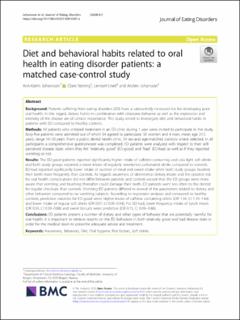| dc.contributor.author | Johansson, Ann-Katrin Gerd | |
| dc.contributor.author | Norring, Claes | |
| dc.contributor.author | Unell, Lennart | |
| dc.contributor.author | Johansson, Anders Arne | |
| dc.date.accessioned | 2021-05-26T07:53:55Z | |
| dc.date.available | 2021-05-26T07:53:55Z | |
| dc.date.created | 2021-01-12T16:37:36Z | |
| dc.date.issued | 2020 | |
| dc.identifier.issn | 2050-2974 | |
| dc.identifier.uri | https://hdl.handle.net/11250/2756383 | |
| dc.description.abstract | Background
Patients suffering from eating disorders (ED) have a substantially increased risk for developing poor oral health. In this regard, dietary habits in combination with obsessive behavior as well as the expression and intensity of the disease are of utmost importance. This study aimed to investigate diet and behavioral habits in patients with ED compared to healthy controls.
Methods
All patients who initiated treatment in an ED clinic during 1 year were invited to participate in the study. Sixty-five patients were admitted out of which 54 agreed to participate: 50 women and 4 men, mean age 21.5 years, range 10–50 years. From a public dental health clinic, 54 sex-and age-matched controls where selected. In all participants a comprehensive questionnaire was completed. ED patients were analyzed with respect to their self-perceived disease state: when they felt “relatively good” (ED-good) and “bad” (ED-bad) as well as if they reported vomiting or not.
Results
The ED-good patients reported significantly higher intake of caffeine-containing and cola light soft drinks and both study groups reported a lower intake of regularly sweetened carbonated drinks compared to controls. ED-bad reported significantly lower intake of number of meal and sweet intake while both study groups brushed their teeth more frequently than controls. As regards awareness of detrimental dietary intake and the possible risk for oral health complications did not differ between patients and controls except that the ED groups were more aware that vomiting and brushing thereafter could damage their teeth. ED patients went less often to the dentist for regular checkups than controls. Vomiting ED patients differed in several of the parameters related to dietary and other behaviors compared to no vomiting subjects. According to regression analyses and compared to healthy controls, predictive variables for ED-good were: higher intake of caffeine containing drinks (OR 1.34, CI 1.10–1.64) and lower intake of regular soft drinks (OR 0.57, CI 0.35–0.94). For ED-bad, lower frequency intake of lunch meals (OR 0.59, CI 0.39–0.88) and sweet biscuits were predictive (OR 0.15, CI 0.05–0.48).
Conclusions
ED patients present a number of dietary and other types of behavior that are potentially harmful for oral health. It is important to retrieve reports on the ED behaviors in both relatively good and bad disease state in order for the medical team to prescribe adequate advice and treatment. | en_US |
| dc.language.iso | eng | en_US |
| dc.publisher | BMC | en_US |
| dc.rights | Navngivelse 4.0 Internasjonal | * |
| dc.rights.uri | http://creativecommons.org/licenses/by/4.0/deed.no | * |
| dc.title | Diet and behavioral habits related to oral health in eating disorder patients: a matched case-control study | en_US |
| dc.type | Journal article | en_US |
| dc.type | Peer reviewed | en_US |
| dc.description.version | publishedVersion | en_US |
| dc.rights.holder | Copyright The Author(s). 2020 | en_US |
| dc.source.articlenumber | 7 | en_US |
| cristin.ispublished | true | |
| cristin.fulltext | original | |
| cristin.qualitycode | 1 | |
| dc.identifier.doi | 10.1186/s40337-020-0281-z | |
| dc.identifier.cristin | 1870081 | |
| dc.source.journal | Journal of Eating Disorders | en_US |
| dc.identifier.citation | Journal of Eating Disorders. 2020, 8, 7. | en_US |
| dc.source.volume | 8 | en_US |

